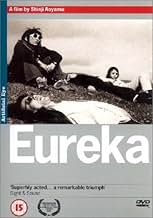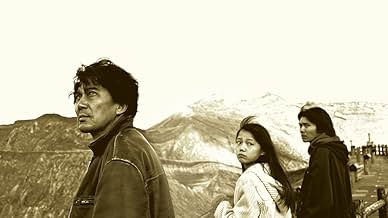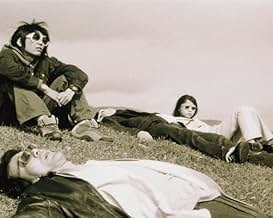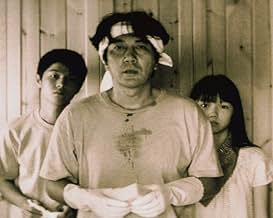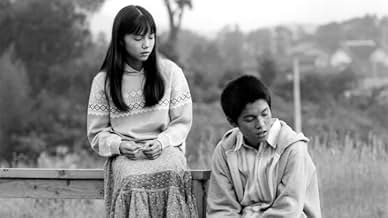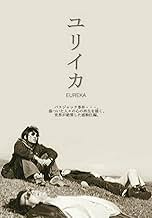NOTE IMDb
7,7/10
4,6 k
MA NOTE
Ajouter une intrigue dans votre langueThe traumatized survivors of a murderous bus hijacking come together and take a road trip to attempt to overcome their damaged selves. Meanwhile a serial killer is on the loose.The traumatized survivors of a murderous bus hijacking come together and take a road trip to attempt to overcome their damaged selves. Meanwhile a serial killer is on the loose.The traumatized survivors of a murderous bus hijacking come together and take a road trip to attempt to overcome their damaged selves. Meanwhile a serial killer is on the loose.
- Réalisation
- Scénario
- Casting principal
- Récompenses
- 4 victoires et 2 nominations au total
Avis à la une
Amazing film. The reviews posted - at the time of this writing - on the IMDb page are sad, because I don't think the writers were ready for what kind of movie it is. (Stephen Holden's pan in the New York Times is especially foolhardy and thoughtless.) It helped to have a little advanced word, in order to brace myself. As it stands, it should have defeated "Dancer in the Dark" at Cannes last year, handily. And if I see a better movie this year, it'll be something for the history books.
It's not for the faint of heart. It's three hours and thirty-seven minutes long, in black and white, and in Japanese. And it's very slow-moving. The cinematography is beautiful, but that may not be enough for folks to hack through nearly four hours.
But the extreme length and slowness is not unjustified. It opens with a horrifying, traumatic event that provides an emotional undercurrent that informs the remainder of the story, in much the same way as "Saving Private Ryan" did (let that not discourage the anti-Spielbergers), and as the film progresses, the event becomes a memory, part of the characters' and ours, too. And the slowness isn't really slowness - it's the playing out of events and interactions as they would happen in real time (the story spans a few months, I believe, perhaps even a year, and maybe more).
"What's the freaking story?" I hear you ask...well, here goes. The opening sequence, which will undoubtedly inspire comparisons and contrasts to "The Sweet Hereafter" (as will the entire film), shows the hijacking of a commuter bus by a businessman pushed over the edge. As the scene unfolds, he has already killed a few passengers, the police are surrounding the bus, and he has used newspapers to block all the windows.
Without revealing too much, the bus driver and two teens - a brother and a sister - survive the incident. The driver (Koji Yakusho, star of "Shall We Dance?" and "The Eel") is shaken deeply, and leaves his brother and parents to wander. The youths' mother runs off with another man, and their father dies soon after in an auto accident - with insurance payments, they can live, but there is no one to watch over them.
I could go into more of the plot - and most critics will, I'm sure - but that isn't really necessary. The key to the movie is that the events seem to be played out as they would in real life, and that the movie camera just "happens to be there" to catch them and tell the story. Sure, this is the goal of all narrative films, but with "Eureka," the process seems to have been reinvented and renewed. The film is longer than most, but not a moment is wasted; it's one of the most efficiently edited movies I've ever seen. Every shot, nuance, glance, spoken word, everything has a reason for being.
There are some who say the movie is too somber, too gloomy. It isn't really. It's somber, sure, but it doesn't strain for it. There is humor - deadpan, mostly - and great joy, too. And if you love great cinema, there is even greater joy!
It's not for the faint of heart. It's three hours and thirty-seven minutes long, in black and white, and in Japanese. And it's very slow-moving. The cinematography is beautiful, but that may not be enough for folks to hack through nearly four hours.
But the extreme length and slowness is not unjustified. It opens with a horrifying, traumatic event that provides an emotional undercurrent that informs the remainder of the story, in much the same way as "Saving Private Ryan" did (let that not discourage the anti-Spielbergers), and as the film progresses, the event becomes a memory, part of the characters' and ours, too. And the slowness isn't really slowness - it's the playing out of events and interactions as they would happen in real time (the story spans a few months, I believe, perhaps even a year, and maybe more).
"What's the freaking story?" I hear you ask...well, here goes. The opening sequence, which will undoubtedly inspire comparisons and contrasts to "The Sweet Hereafter" (as will the entire film), shows the hijacking of a commuter bus by a businessman pushed over the edge. As the scene unfolds, he has already killed a few passengers, the police are surrounding the bus, and he has used newspapers to block all the windows.
Without revealing too much, the bus driver and two teens - a brother and a sister - survive the incident. The driver (Koji Yakusho, star of "Shall We Dance?" and "The Eel") is shaken deeply, and leaves his brother and parents to wander. The youths' mother runs off with another man, and their father dies soon after in an auto accident - with insurance payments, they can live, but there is no one to watch over them.
I could go into more of the plot - and most critics will, I'm sure - but that isn't really necessary. The key to the movie is that the events seem to be played out as they would in real life, and that the movie camera just "happens to be there" to catch them and tell the story. Sure, this is the goal of all narrative films, but with "Eureka," the process seems to have been reinvented and renewed. The film is longer than most, but not a moment is wasted; it's one of the most efficiently edited movies I've ever seen. Every shot, nuance, glance, spoken word, everything has a reason for being.
There are some who say the movie is too somber, too gloomy. It isn't really. It's somber, sure, but it doesn't strain for it. There is humor - deadpan, mostly - and great joy, too. And if you love great cinema, there is even greater joy!
10x-miner
I've seen EUREKA yesterday, and I really am impressed.
Along with those beautiful and sophisticated pictures in coloured black-and-white comes a great story; the movie takes both its time to roll out the plot and portrait the main characters. Each single scene is valuable, worth to be seen, contributes a lot to the whole, EUREKA is --despite its sheer enormity-- concentrated on the essentials and thus compact... and: the characters are authentic.
What else can I say? Go, see and feel it!
Along with those beautiful and sophisticated pictures in coloured black-and-white comes a great story; the movie takes both its time to roll out the plot and portrait the main characters. Each single scene is valuable, worth to be seen, contributes a lot to the whole, EUREKA is --despite its sheer enormity-- concentrated on the essentials and thus compact... and: the characters are authentic.
What else can I say? Go, see and feel it!
It has been almost 6 years since I saw this film, yet this film can stick with me and still offer me things.
After a tragic incident of violence, a bus driver tries to find two other teen-aged survivors, a brother and sister. The sparse black and white camera work provide an insight into the bleak emotional landscape as they just stumble through as "walking dead". Having lost a father, I can identify with the characters. What is touching is the lack of communication and dialogue between the actors (whic includes the lead of the Japanese "Shall We Dance" ). Yet there is love and communication made even by just the thumping on bus walls. Words fail them.
The camera work is bleak yet stunning in composition and texture. Minimal yet just enough to feel the principals trying to find meaning in life. One can also speak of the Japanese economic downturn and the resulting introspective dramatic films such as Hirokazu's "After Life". If have experienced grief or if you'd like to find some insight into it, this may be a film. It seemed shorter than the four hours, but you are forewarned.
After a tragic incident of violence, a bus driver tries to find two other teen-aged survivors, a brother and sister. The sparse black and white camera work provide an insight into the bleak emotional landscape as they just stumble through as "walking dead". Having lost a father, I can identify with the characters. What is touching is the lack of communication and dialogue between the actors (whic includes the lead of the Japanese "Shall We Dance" ). Yet there is love and communication made even by just the thumping on bus walls. Words fail them.
The camera work is bleak yet stunning in composition and texture. Minimal yet just enough to feel the principals trying to find meaning in life. One can also speak of the Japanese economic downturn and the resulting introspective dramatic films such as Hirokazu's "After Life". If have experienced grief or if you'd like to find some insight into it, this may be a film. It seemed shorter than the four hours, but you are forewarned.
Hailed as a masterpiece by some, and a near one by others, I liked it quite a bit, and never felt bored in spite of it's nearly 4 hour running time. I was quite moved – to the point of tears - by the end.
It looks and feels like no other movie I've seen, shot in a shifting sepia tone, with very little dialogue, and long silent takes. It's an intimate epic. Sort of a Japanese version of a Terrence Malick film.
A young brother and sister, and a bus driver are the only survivors of a random bus-jacking by a madman. The three retreat from the world. But two years later the bus driver seeks out the brother and sister – living alone and mute despite their youth – and the long, slow process of healing begins.
As much as I liked a lot of it, certain plot twists felt clunky or heavy handed, as did some of the dialogue. A movie so based in unspoken emotion loses something when the themes suddenly become too literal, in word or action. But, those are things that might bother me less on a second viewing, when I was more prepared for this unique, odd, challenging film.
It looks and feels like no other movie I've seen, shot in a shifting sepia tone, with very little dialogue, and long silent takes. It's an intimate epic. Sort of a Japanese version of a Terrence Malick film.
A young brother and sister, and a bus driver are the only survivors of a random bus-jacking by a madman. The three retreat from the world. But two years later the bus driver seeks out the brother and sister – living alone and mute despite their youth – and the long, slow process of healing begins.
As much as I liked a lot of it, certain plot twists felt clunky or heavy handed, as did some of the dialogue. A movie so based in unspoken emotion loses something when the themes suddenly become too literal, in word or action. But, those are things that might bother me less on a second viewing, when I was more prepared for this unique, odd, challenging film.
Probably the only thing that has happened to me which i cannot express in words. Maybe thats what the director 'Shiniji' felt and instead of trying to express is it in heavy-Hollywood-dialogs syndrome, he chose the absolutely pinnacle and quintessential form of communication- ...... If you are looking for the definition of that art, you wouldn't just find,because it doesn't exist. You have to see this movie to venture into the world which is way beyond cinema and story-telling.
Each character has just defied the very fabric of artificial situations that are cinematic and have stepped into the horizons of real world much real that what we see now. Shiniji's brilliance is not only in the way he picked up the situation and silhouetted it with ever so beautiful backdrop but also in that fact that he hasn't compromised on the lines of letting the movie talk with its aura of silence. Many great directors would have been tempted to use the brilliant characters of Naoki and Kozue to speak up their frustration(a usual ploy in American and European Cinema) to reassure their directorial capabilities, but Shiniji's belief in the movie and its characters was much more intense than both his audience and himself.
Now a little about the movie. Eureka centrally addresses the condensed emotions of people who go through a catastrophe which might not be fatal physically but is absolutely draining mentally. The eventual darkness of body and mind that leads such people to imagine heinous crimes like murder without knowing the true essence of its legitimacy. It deals with complete disintegration of human psyche to unwanted darkness. But it also shows the inevitability of human victory of life and happiness over death and darkness. Eureka tours the human road-map of complete disillusionment and back to reclaim its lost grounds.
Naoki and Kozue though being kids display a true situation that can drive even kids to craziness. Though not being dumb, words have not been their respite. The killing emptiness within woven with their apathetic vocals drilled them to their core and they became immune to popular practice of existence. Talking and involving with others were a waste, for nothing in the world could bring them what they lost. And if you ask what they lost, they cant describe it, I cant describe it, and neither can Shiniji. We can only feel it.
Makoto together with the kids was also a subject to the catastrophe. It hit him so hard mentally that he lost himself to isolation. But he regrouped and returned to his home just to find that things have changed around him, he could not justify but accepted it because he could find himself a reason to it. He visits the kids and they form a small family in which no one has to say that they care for each other, they just have to feel.
I can go on for this movie for the rest of my life but if you are alive you will see it.
Each character has just defied the very fabric of artificial situations that are cinematic and have stepped into the horizons of real world much real that what we see now. Shiniji's brilliance is not only in the way he picked up the situation and silhouetted it with ever so beautiful backdrop but also in that fact that he hasn't compromised on the lines of letting the movie talk with its aura of silence. Many great directors would have been tempted to use the brilliant characters of Naoki and Kozue to speak up their frustration(a usual ploy in American and European Cinema) to reassure their directorial capabilities, but Shiniji's belief in the movie and its characters was much more intense than both his audience and himself.
Now a little about the movie. Eureka centrally addresses the condensed emotions of people who go through a catastrophe which might not be fatal physically but is absolutely draining mentally. The eventual darkness of body and mind that leads such people to imagine heinous crimes like murder without knowing the true essence of its legitimacy. It deals with complete disintegration of human psyche to unwanted darkness. But it also shows the inevitability of human victory of life and happiness over death and darkness. Eureka tours the human road-map of complete disillusionment and back to reclaim its lost grounds.
Naoki and Kozue though being kids display a true situation that can drive even kids to craziness. Though not being dumb, words have not been their respite. The killing emptiness within woven with their apathetic vocals drilled them to their core and they became immune to popular practice of existence. Talking and involving with others were a waste, for nothing in the world could bring them what they lost. And if you ask what they lost, they cant describe it, I cant describe it, and neither can Shiniji. We can only feel it.
Makoto together with the kids was also a subject to the catastrophe. It hit him so hard mentally that he lost himself to isolation. But he regrouped and returned to his home just to find that things have changed around him, he could not justify but accepted it because he could find himself a reason to it. He visits the kids and they form a small family in which no one has to say that they care for each other, they just have to feel.
I can go on for this movie for the rest of my life but if you are alive you will see it.
Le saviez-vous
- AnecdotesThe brother and sister in the film are played by real life brother and sister Aoi Miyazaki and Masaru Miyazaki.
- Citations
Makoto Sawai: Do you think one can live only for others?
Meilleurs choix
Connectez-vous pour évaluer et suivre la liste de favoris afin de recevoir des recommandations personnalisées
- How long is Eureka?Alimenté par Alexa
Détails
Box-office
- Montant brut aux États-Unis et au Canada
- 49 388 $US
- Montant brut mondial
- 49 388 $US
- Durée
- 3h 37min(217 min)
- Couleur
- Mixage
- Rapport de forme
- 2.35 : 1
Contribuer à cette page
Suggérer une modification ou ajouter du contenu manquant

